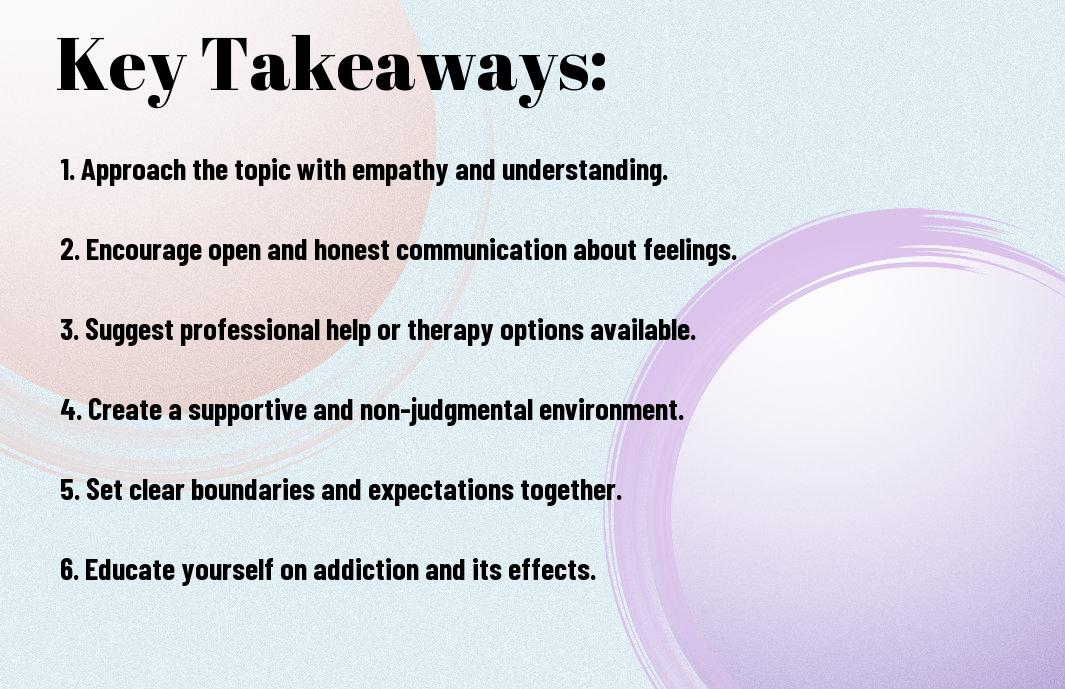Addiction can take a toll on not only the individual but also their loved ones, especially when it comes to porn. If you have a family member struggling with this addiction, it’s important to know how you can make a difference in their journey toward recovery. This blog post provides you with seven effective strategies that you can implement to support your loved one, foster open communication, and create a healthier environment. By understanding these fixes, you can play a pivotal role in helping someone overcome this challenge.
Key Takeaways:
- Approach the topic with empathy and understanding, creating a safe space for open dialogue.
- Encourage the individual to seek professional help, such as therapy or counseling, to address underlying issues.
- Establish healthy boundaries within the family dynamic to foster accountability and support.
- Educate yourself and your family about the nature of addiction to better understand the challenges involved.
- Promote positive activities and hobbies that can replace the time spent on pornography, helping to redirect focus and energy.

Understanding Porn Addiction
Before you can effectively support someone with a porn addiction, it’s imperative to understand what it entails. Porn addiction is characterized by compulsive behavior surrounding pornography use, leading to negative consequences in various aspects of life. It can disrupt relationships, hinder personal development, and contribute to mental health issues. Understanding the foundations of this addiction empowers you to approach the situation with empathy and informed guidance.
Defining Porn Addiction
Across various studies, porn addiction is defined as a dependence on pornography that manifests as an inability to stop viewing it despite a strong desire to do so. This compulsive behavior often leads to emotional distress and impacts daily functionality, resembling other behavioral addictions.
Recognizing Signs and Symptoms
Around someone struggling with porn addiction, you may notice certain behaviors indicative of the problem. These can include excessive time spent viewing porn, neglecting responsibilities, social withdrawal, or an increase in secrecy regarding internet usage.
Further signs can manifest as emotional changes, such as increased anxiety, depression, or irritability when attempting to reduce porn usage. You may also observe shifts in sexual attitudes or expectations, which can affect intimate relationships. If you see these patterns, it may serve as an early indication that your loved one is grappling with porn addiction and may benefit from targeted support and intervention.
Creating a Supportive Environment
One of the most effective ways to help someone struggling with a porn addiction is by fostering a supportive environment in your home. This means creating a space where they feel safe and understood, promoting healthy behaviors, and encouraging open dialogue. Support can come in various forms, including emotional reassurance and practical tools to manage their addiction. Strive to maintain a compassionate atmosphere, free from judgment, which can help them feel more empowered to seek help and confront their challenges.
Open Communication
Along your journey to support someone with a porn addiction, open communication is vital. It’s important to regularly check in with them, allowing them to express their feelings and struggles without fear of being judged. Approach these conversations with empathy and understanding. By fostering an environment where they feel comfortable speaking openly about their experiences, you empower them to face their addiction candidly and take proactive steps toward recovery.
Establishing Healthy Boundaries
With clear and healthy boundaries, you can create a framework that promotes accountability and safety for both you and your loved one. Defining what behaviors are acceptable can help both parties understand limitations and expectations. It’s vital to communicate these boundaries clearly and consistently while also allowing space for negotiation as both of you navigate this complex issue together.
For instance, you might establish specific times for discussions about their recovery while defining durations for personal space or focusing on shared activities. This prevents the conversation from dominating your interactions and allows for moments of normalcy. Boundaries can also encompass internet usage limits or agreeing on what types of media are suitable to consume. The goal is to create a balance that supports recovery without fostering feelings of isolation or resentment.
Encouraging Professional Help
Many people struggling with a porn addiction may benefit from professional help. Encouraging your loved one to seek assistance can be a significant step towards recovery. Sometimes, individuals may feel hesitant, so it is crucial for you to provide support and understanding as they consider this option. By discussing the potential benefits of therapy or support groups, you can help your loved one feel more at ease about seeking the help they need.
Therapy Options
For those battling porn addiction, therapy can be an effective solution. Individual therapy allows your loved one to explore their feelings and behaviors in a safe environment, while cognitive-behavioral therapy can help them identify and change negative thought patterns related to their addiction. Working with a qualified therapist can empower them to develop healthier coping strategies and improve their emotional well-being.
Support Groups
After considering therapy, support groups can also play a vital role in your loved one’s recovery journey. These groups provide a safe space for individuals to share their experiences and learn from others who face similar challenges. By connecting with others in a supportive environment, your loved one can gain valuable insights, encouragement, and motivation to overcome their addiction.
Help is often found in the collective experiences shared within support groups. Individuals can relate to one another’s struggles, fostering a sense of belonging that can be incredibly beneficial. Many groups also provide resources, tools, and accountability, helping participants stay motivated on their recovery path. Encourage your loved one to attend sessions regularly, as consistency can significantly enhance the effectiveness of the support they receive.

Promoting Healthy Habits
To support someone with a porn addiction, it’s important to promote habits that encourage a healthier lifestyle. This involves fostering a balanced routine that includes physical activity, social engagement, and hobbies that can help divert attention away from harmful behaviors. Encourage open conversations about emotions and experiences, as being able to express themselves can greatly reduce the urge to fall back into old patterns. Building a supportive environment at home reinforces the commitment to recovery and helps in establishing a new, healthier normal.
Limiting Triggers
Against distractions that fuel urges, it’s imperative to identify and limit exposure to triggers. This may include monitoring internet usage, using privacy filters or tools that block adult content, and creating a safe online environment. Engage in discussions about the specific situations or feelings that lead to cravings, so you can work together to avoid or cope with these triggers effectively. Awareness can significantly reduce the chances of relapse.
Encouraging Replacements
Across your efforts to help, substituting unhealthy behaviors with positive alternatives can be very effective. Explore new activities that your loved one enjoys, such as sports or creative hobbies, that can serve as fulfilling replacements for viewing pornography. Encourage them to develop interests that nurture their skills and passions, which can help shift focus away from addictive behaviors and toward constructive engagement with life.
Understanding the need for replacements is vital in the journey toward recovery. By identifying new interests or hobbies, you can help your loved one cultivate a lifestyle that significantly reduces their reliance on pornography. Activities such as exercising, learning a musical instrument, or volunteering can provide a sense of purpose and fulfillment, restoring confidence and self-worth. These positive engagements not only distract from old habits but also contribute to emotional and mental well-being, reinforcing the importance of finding joy outside of addiction.

Educating on Internet Safety
All families play a vital role in fostering a safe online environment. By educating yourself and your loved ones about the potential pitfalls of internet use, you create a culture of awareness and responsibility. Discussing the difference between healthy and unhealthy content can help clarify boundaries, making it easier for everyone to navigate the digital world. Encourage open communication so that your family feels comfortable discussing their online experiences without fear of judgment.
Tools and Software
Alongside education, utilizing appropriate tools can significantly enhance internet safety. There are various software options available that can help monitor and restrict access to inappropriate content. These programs allow you to set customized filters, ensuring a healthier online experience for your loved ones. By selecting tools that align with your family’s values and needs, you contribute to a safer internet environment.
Setting Up Parental Controls
Along with educational efforts, setting up parental controls is an effective step toward protecting your family online. Parental controls allow you to restrict access to certain websites or types of content, helping manage what your family sees and engages with. Make this a collaborative effort by involving your family in the discussion about which restrictions to implement, fostering a sense of ownership and understanding.
Setting up parental controls is a straightforward process that can have lasting benefits. Depending on your internet service provider, software, or devices, you can customize settings to block specific websites, limit screen time, or monitor online activity. Begin by exploring the options available on your devices and engaging your family in creating a balanced approach to internet use that suits everyone’s needs.
Fostering Resilience and Recovery
Now, fostering resilience and recovery in someone struggling with a porn addiction requires patience and understanding. You can support their journey by recognizing the importance of self-care, therapy, and healthy coping strategies. Encourage them to seek professional help and consider exploring resources like How To Help Someone with A Porn Addiction for guidance. Creating an environment that nurtures growth and open communication is vital for lasting change.
Celebrating Progress
With every step toward recovery, it’s important to celebrate milestones, no matter how small. Acknowledging positive changes in their behavior helps build confidence and motivates further progress. Encourage them to recognize their efforts and achievements, reinforcing that recovery is a journey filled with ups and downs.
Building a Support Network
On the road to recovery, building a support network can significantly enhance your loved one’s chances of overcoming their addiction. Connecting them with friends, family members, or support groups fosters a sense of community and belonging.
Understanding the importance of a strong support network is vital for someone battling addiction. You can actively participate by introducing them to local or online support groups where they can share experiences and gain insights from others who have faced similar challenges. Engaging in open conversations with trusted individuals creates a safe space for your loved one, reinforcing the belief that they are not alone in their recovery efforts.

To wrap up
Presently, acknowledging and addressing a loved one’s porn addiction can be challenging but rewarding. By employing these seven strategies, you can cultivate understanding, support healthy communication, and encourage professional help. Your involvement can significantly impact their journey toward recovery. For further insights and guidance, consider exploring How to Help Someone with a Porn Addiction. Your commitment to their well-being is an important step in promoting healing and restoration in your relationship.
FAQ
Q: What are the signs of porn addiction?
A: Signs of porn addiction may include excessive viewing of pornographic material, neglecting responsibilities or relationships, experiencing feelings of guilt or shame after viewing, and using porn as a coping mechanism for stress or emotional issues.
Q: How can I approach someone about their porn addiction?
A: When approaching someone about their addiction, choose a calm setting and time for the conversation. Use “I” statements to express your concern, such as “I feel worried about how this affects you.” Avoid accusations and focus on your desire to support and understand them.
Q: What specific steps can families take to support a loved one with a porn addiction?
A: Families can provide support by encouraging open communication, educating themselves about addiction, setting healthy boundaries, and seeking professional help together. Creating a safe space for discussions about feelings and struggles can also be beneficial.
Q: Are there any resources or programs available for families dealing with porn addiction?
A: Yes, numerous resources are available, including support groups like Sex Addicts Anonymous (SAA), family therapy sessions, and online resources that focus on understanding porn addiction and providing coping strategies for affected families.
Q: How can open communication impact recovery from porn addiction?
A: Open communication helps to build trust and understanding in the relationship. It allows for the sharing of feelings, frustrations, and progress, which can foster a supportive environment that encourages the individual to seek help and stay committed to recovery.
Q: Should I suggest therapy or counseling for my loved one struggling with porn addiction?
A: Suggesting therapy can be a positive step, as professional help offers a safe space for the individual to explore their addiction, triggers, and underlying emotional issues. Encourage them to consider therapy as a constructive option rather than a punishment.
Q: How can I take care of my own well-being while supporting someone with a porn addiction?
A: It’s vital to prioritize self-care by setting boundaries, seeking support for yourself (such as joining a support group or talking to a therapist), and maintaining your own hobbies and interests. Taking care of your emotional needs will enable you to provide better support for your loved one.
